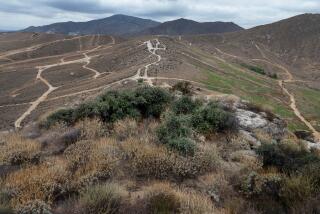Developer Backs Off Plan to Remove Rare Plant : Environment: The firm suspends for at least 90 days pulling the slender-horned spineflower from Big Tujunga Wash.
- Share via
An embattled developer has temporarily dropped its threat to remove an endangered plant that has stalled for more than five years its proposal to build a private golf club in Big Tujunga Wash.
Cosmo World Corp., a Japanese-owned golf course development company, notified state and local wildlife officials this week that it has suspended for at least 90 days its plan to remove the rare slender-horned spineflower from the wash.
Cosmo’s plan to remove the flower, announced two weeks ago, caused an uproar, including threats of legal action against the company.
The spineflower is a fragile but unremarkable-looking plant that has done much to stymie Cosmo’s project for developing its 355-acre parcel in rugged Big Tujunga Wash, an area designated as one of a handful of natural and environmentally sensitive areas in Los Angeles.
The latest controversy began two weeks ago when Cosmo, citing an obscure state law, notified government wildlife agencies that they had 10 days to “salvage” the spineflower before the company removed the plant from its property in Big Tujunga Wash.
But, in a letter last Friday, the state Department of Fish and Game warned Cosmo that it would sue to block its plan.
On Monday, an attorney for Cosmo told state and federal wildlife officials that his client would not move against the plant for another 90 days, saying the company was backing off at the urging of Los Angeles City Councilman Joel Wachs. Wachs represents Sunland, where Big Tujunga Wash is located.
Cosmo attorney Andrew Hartzell said his client hoped to use the extra time to reach an agreement with them on a “fair and acceptable mitigation program” to protect the spineflower.
Hartzell said his client only resorted to the threat of removing the spineflower after its latest proposal for dealing with the plant received a cool reception from government wildlife officials.
Cosmo recently proposed to create a 78-acre spineflower preserve on its property and agreed to fund the first-ever comprehensive study of the plant. But this plan was greeted with disinterest by the U. S. Fish and Wildlife Service in recent negotiations, Hartzell said in his letter.
The Wildlife Service said several years ago that Cosmo’s original golf course plan, despite mitigations to protect the spineflower, would jeopardize the endangered plant. No opinion has been issued by the service regarding Cosmo’s latest plan.
However, Peter Stine, acting field supervisor for the Wildlife Service, said Tuesday that his agency remains concerned that Cosmo’s latest plan still may not set aside enough acreage for a viable preserve nor steer enough floodwaters from the wash onto the preserve. It is believed that the spineflower can only survive in a periodically flooded habitat.
If the wildlife service does not ratify Cosmo’s mitigation plan, the U. S. Army Corps of Engineers is less likely to issue a permit Cosmo needs from that agency to build the golf course, Stine said.
Cosmo first began buying land in the wash in 1987 and has been trying almost continuously ever since to win approvals for its golf course. It needs a conditional use permit from the city and another permit from the Corps of Engineers, which has jurisdiction over the wash.
More to Read
Sign up for Essential California
The most important California stories and recommendations in your inbox every morning.
You may occasionally receive promotional content from the Los Angeles Times.










